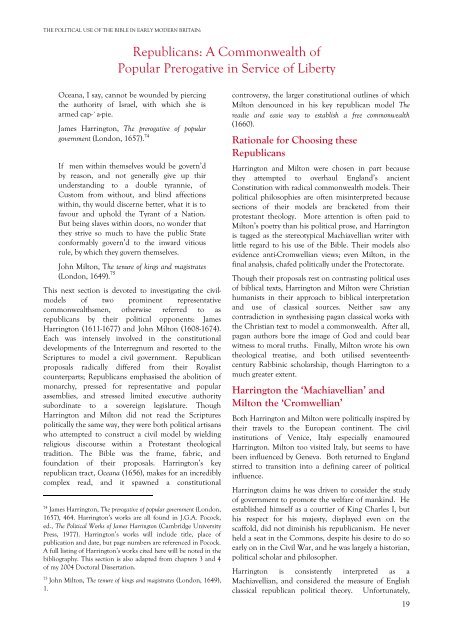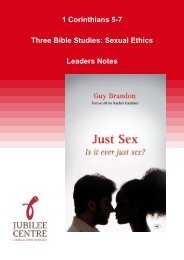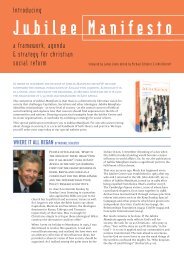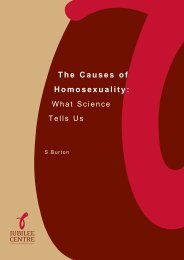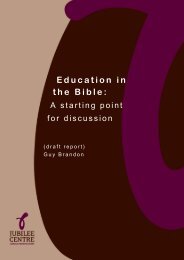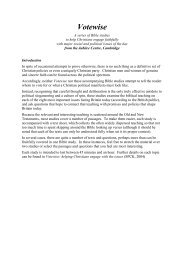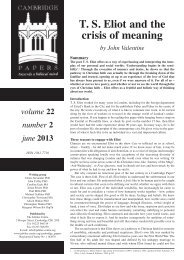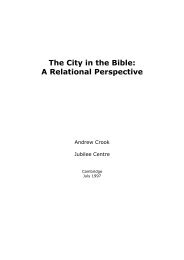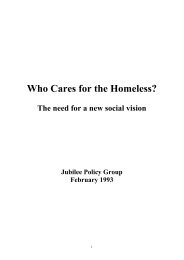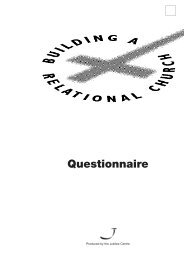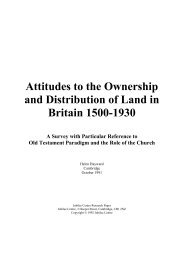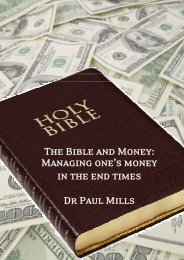Report Template - Jubilee Centre
Report Template - Jubilee Centre
Report Template - Jubilee Centre
You also want an ePaper? Increase the reach of your titles
YUMPU automatically turns print PDFs into web optimized ePapers that Google loves.
THE POLITICAL USE OF THE BIBLE IN EARLY MODERN BRITAIN:<br />
Republicans: A Commonwealth of<br />
Popular Prerogative in Service of Liberty<br />
Oceana, I say, cannot be wounded by piercing<br />
the authority of Israel, with which she is<br />
armed cap-`a-pie.<br />
James Harrington, The prerogative of popular<br />
government (London, 1657). 74<br />
If men within themselves would be govern’d<br />
by reason, and not generally give up thir<br />
understanding to a double tyrannie, of<br />
Custom from without, and blind affections<br />
within, thy would discerne better, what it is to<br />
favour and uphold the Tyrant of a Nation.<br />
But being slaves within doors, no wonder that<br />
they strive so much to have the public State<br />
conformably govern’d to the inward vitious<br />
rule, by which they govern themselves.<br />
John Milton, The tenure of kings and magistrates<br />
(London, 1649). 75<br />
This next section is devoted to investigating the civilmodels<br />
of two prominent representative<br />
commonwealthsmen, otherwise referred to as<br />
republicans by their political opponents: James<br />
Harrington (1611-1677) and John Milton (1608-1674).<br />
Each was intensely involved in the constitutional<br />
developments of the Interregnum and resorted to the<br />
Scriptures to model a civil government. Republican<br />
proposals radically differed from their Royalist<br />
counterparts; Republicans emphasised the abolition of<br />
monarchy, pressed for representative and popular<br />
assemblies, and stressed limited executive authority<br />
subordinate to a sovereign legislature. Though<br />
Harrington and Milton did not read the Scriptures<br />
politically the same way, they were both political artisans<br />
who attempted to construct a civil model by wielding<br />
religious discourse within a Protestant theological<br />
tradition. The Bible was the frame, fabric, and<br />
foundation of their proposals. Harrington’s key<br />
republican tract, Oceana (1656), makes for an incredibly<br />
complex read, and it spawned a constitutional<br />
74<br />
James Harrington, The prerogative of popular government (London,<br />
1657), 464. Harrington’s works are all found in J.G.A. Pocock,<br />
ed., The Political Works of James Harrington (Cambridge University<br />
Press, 1977). Harrington’s works will include title, place of<br />
publication and date, but page numbers are referenced in Pocock.<br />
A full listing of Harrington’s works cited here will be noted in the<br />
bibliography. This section is also adapted from chapters 3 and 4<br />
of my 2004 Doctoral Dissertation.<br />
75<br />
John Milton, The tenure of kings and magistrates (London, 1649),<br />
1.<br />
controversy, the larger constitutional outlines of which<br />
Milton denounced in his key republican model The<br />
readie and easie way to establish a free commonwealth<br />
(1660).<br />
Rationale for Choosing these<br />
Republicans<br />
Harrington and Milton were chosen in part because<br />
they attempted to overhaul England’s ancient<br />
Constitution with radical commonwealth models. Their<br />
political philosophies are often misinterpreted because<br />
sections of their models are bracketed from their<br />
protestant theology. More attention is often paid to<br />
Milton’s poetry than his political prose, and Harrington<br />
is tagged as the stereotypical Machiavellian writer with<br />
little regard to his use of the Bible. Their models also<br />
evidence anti-Cromwellian views; even Milton, in the<br />
final analysis, chafed politically under the Protectorate.<br />
Though their proposals rest on contrasting political uses<br />
of biblical texts, Harrington and Milton were Christian<br />
humanists in their approach to biblical interpretation<br />
and use of classical sources. Neither saw any<br />
contradiction in synthesising pagan classical works with<br />
the Christian text to model a commonwealth. After all,<br />
pagan authors bore the image of God and could bear<br />
witness to moral truths. Finally, Milton wrote his own<br />
theological treatise, and both utilised seventeenthcentury<br />
Rabbinic scholarship, though Harrington to a<br />
much greater extent.<br />
Harrington the ‘Machiavellian’ and<br />
Milton the ‘Cromwellian’<br />
Both Harrington and Milton were politically inspired by<br />
their travels to the European continent. The civil<br />
institutions of Venice, Italy especially enamoured<br />
Harrington. Milton too visited Italy, but seems to have<br />
been influenced by Geneva. Both returned to England<br />
stirred to transition into a defining career of political<br />
influence.<br />
Harrington claims he was driven to consider the study<br />
of government to promote the welfare of mankind. He<br />
established himself as a courtier of King Charles I, but<br />
his respect for his majesty, displayed even on the<br />
scaffold, did not diminish his republicanism. He never<br />
held a seat in the Commons, despite his desire to do so<br />
early on in the Civil War, and he was largely a historian,<br />
political scholar and philosopher.<br />
Harrington is consistently interpreted as a<br />
Machiavellian, and considered the measure of English<br />
classical republican political theory. Unfortunately,<br />
19


